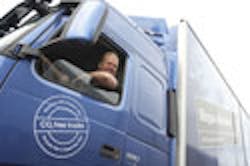BRUSSELS. Global climate change "is the most pressing issue of our generation,” according to Volvo Group CEO, Leif Johansson. Addressing a standing-room only audience yesterday at the 2007 European Transport Forum, "Making Sense of the Great Debate on New Fuel Technologies" Johansson said: “Some of us who are engineers think it is a very exciting time, too. The public, perhaps for the first time, is very interested in combustion engines and what we as an industry have to say."
Held at the AutoWorld facility in Brussels, the two-day meeting has drawn participants from around the world and was organized and hosted by the Volvo Group and Forum Europe.
In his opening statement, Johansson noted that there are two major ways to address climate change -- by switching to cleaner alternative fuels and by using less of whatever fuels are used, regardless of the source. He also gave the nod to the diesel engine as "the most promising energy converter" and pledged that Volvo was ready to tackle the challenge of developing carbon-free transport. "We possess the technology and the resources for carbon-dioxide-free transport, but we cannot do this alone," he said.
While climate change is the primary reason to move toward carbon-free transportation as quickly as possible, Johansson made a much broader case for the importance of the mission ahead, citing other reasons for immediate action, such as the fact that oil production is peaking and the ongoing volatility of oil prices and even supply. He also noted a very strong correlation between a healthy transportation system in the EU and a healthy economy overall.
"Growth in the transportation sector is another reason we have to reduce emissions," he added. "Goods transport accounts for 4% of the greenhouse gas emissions now. Our customers also have a need to reduce their operating costs via better fuel efficiency. That is also a very strong driver from a business point of view."
Throughout his presentation, Johansson remained optimistic and even enthusiastic about the likelihood of success in achieving carbon-free transportation. "Essentially, we will reduce harmful emissions of particulates and N0x to zero by 2010," he observed. "The remaining issue after 2010 will be carbon dioxide. Different parts of the world will have different alternative fuels that are easier for them to implement.
"We can roll out these types of technologies rather quickly all around the world," he added. "The issues are fuel availability, standards and fuel supply. We require large-scale production of renewable fuels and putting such production in operation requires extensive investments in research and development, and also well-defined, common guidelines from authorities in as many countries as possible."
Volvo carried out its own analysis of renewable fuels that the company believes are most suitable for carbon-dioxide-free transportation, based upon numerous factors, including their impact on the environment, energy efficiency, the efficiency level in the use of the land for cultivating crops for the respective fuels, the potential production volumes of the different fuels, the level of technical vehicle adaptation required, and the costs of the fuels and the ease of distribution.
Seven fuel options made the cut, and Volvo offered a proof statement for each by driving in seven demonstration trucks, each powered by one of the alternative fuel choices: biodiesel, biogas, biogas plus biodiesel, dimethyl ether (DME), ethanol/methanol, synthetic diesel and hydrogen gas plus biogas.
Jan-Eric Sundgren, senior VP environmental and public affairs for the Volvo Group also provided a detailed look at each fuel option and Hakan Karlsson, president of Volvo Bus Corp., and a member of the group executive committee of AB Volvo, discussed the considerable contributions diesel-electric hybrid vehicles can make to reducing greenhouse gases. "Our test bus in London achieved a 30% fuel reduction," he said. "We have everything to gain with hybrid technology."
About the Author
Wendy Leavitt
Wendy Leavitt is a former FleetOwner editor who wrote for the publication from 1998 to 2021.
